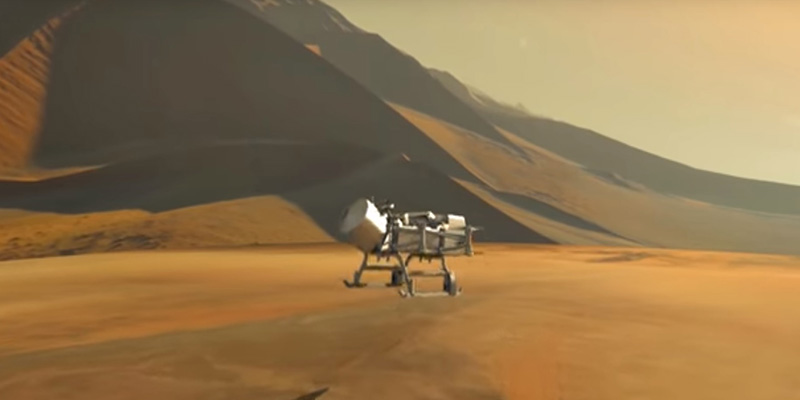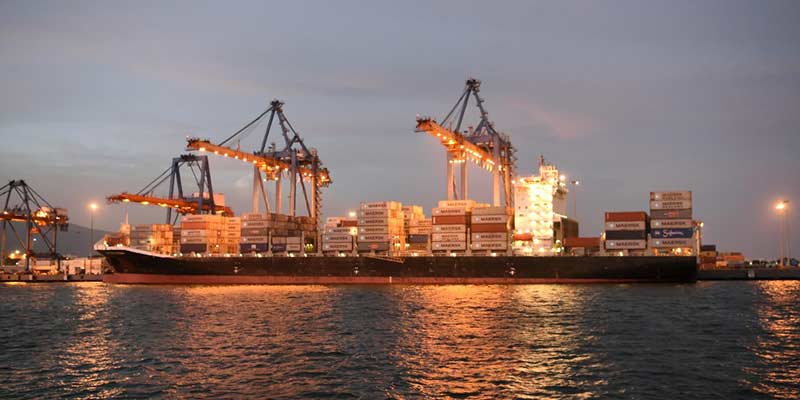- India
- Jul 12
Short Takes / NASA’s Dragonfly
NASA’s Dragonfly to explore Titan
NASA has announced that it would launch a spacecraft to explore the unique and richly organic world Titan. Titan is an analog to the very early Earth and can provide clues to how life may have arisen on our planet.
Dragonfly
Dragonfly will be launched in 2026 and reach Titan in 2034. The rotorcraft will fly to dozens of promising locations on Titan looking for prebiotic chemical processes common on both Titan and Earth.
Dragonfly marks the first time NASA will fly a multi-rotor vehicle for science on another planet. It has eight rotors and flies like a large drone.
It will take advantage of Titan’s dense atmosphere - four times denser than Earth - to become the first vehicle ever to fly its entire science payload to new places for repeatable and targeted access to surface materials.
Mission objectives:
It will explore diverse environments from organic dunes to the floor of an impact crater where liquid water and complex organic materials key to life once existed together for possibly tens of thousands of years.
Its instruments will study how far prebiotic chemistry may have progressed.
They also will investigate the moon’s atmospheric and surface properties and its subsurface ocean and liquid reservoirs. Additionally, instruments will search for chemical evidence of past or extant life.
Features of Titan:
Titan is larger than the planet Mercury and is the second largest moon in our solar system. Jupiter’s moon Ganymede is just a little bit larger (by about 2 per cent).
Titan’s atmosphere is made mostly of nitrogen, like Earth’s, but with a surface pressure 50 per cent higher than Earth’s. Titan has clouds, rain, rivers, lakes and seas of liquid hydrocarbons like methane and ethane.
The largest seas are hundreds of feet deep and hundreds of miles wide. Beneath Titan’s thick crust of water ice is more liquid - an ocean primarily of water rather than methane.
Titan’s subsurface water could be a place to harbour life as we know it, while its surface lakes and seas of liquid hydrocarbons could conceivably harbour life that uses different chemistry than we are used to - that is, life as we don’t yet know it.
MACN launches port integrity campaign
The Maritime Anti-Corruption Network (MACN) has announced the launch of the Port Integrity Campaign in India.
The campaign, which aims to reduce and (in the long term) eliminate integrity issues and bottlenecks to trade during operations in Indian ports, is a collective action of MACN, the Union government, international organisations and local industry stakeholders.
The pilot of the campaign will take place in Mumbai ports (MbPT and JNPT) and will run until October.
Key activities of the campaign include the implementation of integrity training for port officials and the establishment of clear escalation and reporting processes. Following the pilot, MACN aims to expand the programme to other Indian ports.
Other organisations that are also part of the campaign include the UN Global Compact Network India (UNGCNI) and the World Customs Organisation (WCO).
What is the MACN?
The Maritime Anti-Corruption Network (MACN) is a global business network working towards the vision of a maritime industry free of corruption that enables fair trade to the benefit of society at large.
Established in 2011 by a small group of committed maritime companies, MACN has grown to include over 100 members globally, and has become one of the pre-eminent examples of collective action to tackle corruption.
It works towards the elimination of all forms of maritime corruption by…
* Raising awareness of the challenges faced
* Implementing the MACN Anti-Corruption Principles and co-developing and sharing best practices
* Collaborating with governments, NGOs and civil society to identify and mitigate the root causes of corruption.
* Creating a culture of integrity within the maritime community.


